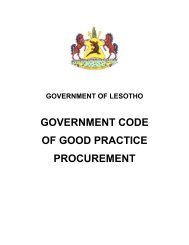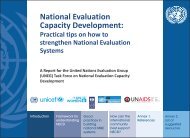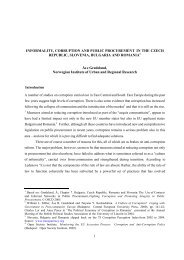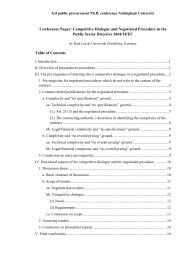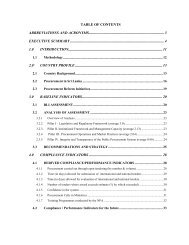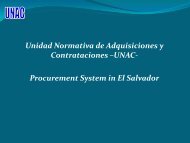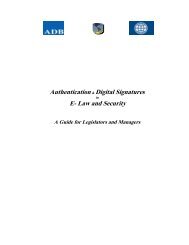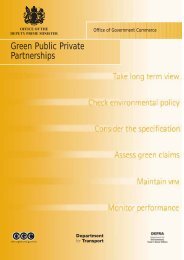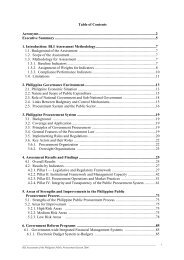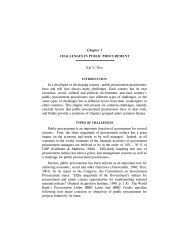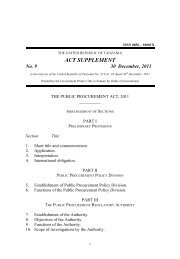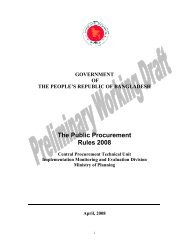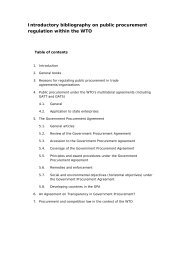Compendium of Country Examples and Lessons Learned from ...
Compendium of Country Examples and Lessons Learned from ...
Compendium of Country Examples and Lessons Learned from ...
Create successful ePaper yourself
Turn your PDF publications into a flip-book with our unique Google optimized e-Paper software.
Based on the assessment reports provided, the following preliminary list <strong>of</strong> key considerations hasbeen developed which will help in co-ordinating <strong>and</strong> planning work.Scope <strong>of</strong> the assessmentWill baseline indicators <strong>and</strong>/or compliance/performance indicators be assessed? At which level willthe assessment take place (national <strong>and</strong> sub-national government, government agencies)? If the subnationallevel is to be covered, the Methodology has to be customised. How many/whichcompliance/performance indicators will be assessed?Stakeholder involvementHow will key stakeholders be sensitised <strong>and</strong> engaged in the assessment process (e.g. letters,workshops, meetings). How many/which donors/stakeholders will participate/will be interviewed inthe assessment <strong>of</strong> the baseline indicators? How many/which donors/stakeholders will be involved togather data for the CPIs? Who are the key focal points within the stakeholder organisations?Identifying a qualified team <strong>of</strong> assessorsIdentifying a qualified team <strong>of</strong> assessors is critical to the credibility <strong>and</strong> reliability <strong>of</strong> the exercise.Assessors should have ample knowledge <strong>of</strong> the institutional <strong>and</strong> operational aspects <strong>of</strong> the subject <strong>and</strong><strong>of</strong> internationally accepted procurement practice. They should be familiar with the assessment tool toensure consistency in its application. Assessors, if external to the government, should work with acounterpart government team in order to develop its capacity to conduct future assessments <strong>and</strong> t<strong>of</strong>acilitate access to information.InterviewsInterviews will be needed to gather facts for assessing the baseline indicators. Interviews should bestructured well in advance. For the BLIs, the preparation should include an overview <strong>of</strong> information tobe collected. A matrix <strong>of</strong> sub-indicators containing the information required <strong>and</strong> potential informantscould be useful. Interview appointments should be made with sufficient notice clarifying theobjectives <strong>of</strong> the assessment (e.g. specifying that the assessment is not an audit). Evidence gathered inthe interviews should be summarised <strong>and</strong> used later in the narrative report. Lastly, interviews orsurveys are useful to collect opinions when addressing the CPIs.Availability <strong>of</strong> data for CPIsWhat are the best sources <strong>of</strong> data needed to measure compliance <strong>and</strong> performance? Is the required dataavailable (statistics, procurement records)? What is the cost/benefit analysis <strong>of</strong> collecting the data?How much data collection is required <strong>and</strong> what sampling approach will be used?Validation processAs stated in the Methodology, 10 in the case <strong>of</strong> a government self-assessment exercise, a validationprocess that involves the government <strong>and</strong> active donors interested in the procurement system will beneeded to contribute to the transparency <strong>and</strong> credibility <strong>of</strong> the process. The validation exerciseprovides an opportunity to agree on assigned scores, reform priorities <strong>and</strong> a shared strategy towardscapacity development initiatives to address key weaknesses in the system.10Methodology for Assessment <strong>of</strong> National Procurement Systems, paragraph 20.COMPENDIUM OF COUNTRY EXAMPLES AND LESSONS LEARNED […] - OECD 2008 19



